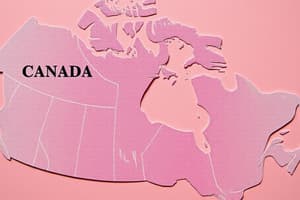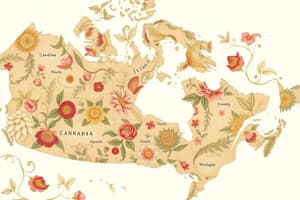Podcast
Questions and Answers
What type of forests are found in the region stretching from south central Alaska to the north-eastern coast of Canada?
What type of forests are found in the region stretching from south central Alaska to the north-eastern coast of Canada?
- Deciduous forests
- Rainforests
- Coniferous forests (correct)
- Temperate forests
What term is used to describe the coniferous forests in Canada?
What term is used to describe the coniferous forests in Canada?
- Mangrove swamps
- Savannah
- Tundra
- Boreal forests (correct)
Which of the following is NOT mentioned as a timber tree found in Canada's coniferous forest region?
Which of the following is NOT mentioned as a timber tree found in Canada's coniferous forest region?
- Spruce
- Pine
- Hemlock
- Cypress (correct)
What is the primary use of softwood sourced from Canada's forests?
What is the primary use of softwood sourced from Canada's forests?
During which season is wood cutting primarily carried out in the forests?
During which season is wood cutting primarily carried out in the forests?
What is the term used to refer to the individuals who engage in cutting wood and transporting it to sawmills and pulp factories?
What is the term used to refer to the individuals who engage in cutting wood and transporting it to sawmills and pulp factories?
How were logs traditionally transported to mills located on the banks of rivers?
How were logs traditionally transported to mills located on the banks of rivers?
What tools were mainly used for felling trees in the early days of logging?
What tools were mainly used for felling trees in the early days of logging?
What vehicle is equipped with machines that can grip and cut down entire trees?
What vehicle is equipped with machines that can grip and cut down entire trees?
What is the process called when a felled and delimbed tree is cut into logs of standard sizes?
What is the process called when a felled and delimbed tree is cut into logs of standard sizes?
Before felling a tree, what equipment is used to climb up and cut off branches and the top?
Before felling a tree, what equipment is used to climb up and cut off branches and the top?
What was typically used to draw sledges loaded with logs to landing sites before the introduction of railways?
What was typically used to draw sledges loaded with logs to landing sites before the introduction of railways?
Flashcards are hidden until you start studying
Study Notes
Logging Process
- Logs are tied together and stacked at landing sites, often on frozen rivers, and then transported to mills when the rivers melt.
- Logs can also be transported by road or rail.
- There are landing sites and mills near roads and railways as well.
Historical Logging Conditions
- In the past, loggers worked six days a week from dawn to dusk with simple tools, requiring a lot of physical labor.
- Conditions have improved over time.
Felling Trees
- In the past, trees were felled mainly with axes.
- Today, trees are felled with crosscut saws and power-driven chainsaws.
- Harvesters and feller bunchers may be used for felling small trees.
Preparing Trees for Felling
- The limbs (branches) and top of a tree are cut off before or after felling.
- A high rigger climbs up the tree using iron hooks and rope to cut off the branches and top.
Bucking
- A felled and delimbed tree is cut into logs of standard sizes, a process called bucking.
- A logger who specializes in this job is called a buck sawyer.
Skidding and Hauling
- In the past, logs were skidded, or dragged, to landing sites using sledge.
- Oxen, mules, or horses were used to pull the sledge.
- Skidding was mostly done in winter as the snow-covered ground made it easier to drag the load.
Case Study: Lumbering in Canada
- The region stretching from south central Alaska to the north-eastern coast of Canada has short, warm summers and long, severe winters with snowfall.
- This region has evergreen coniferous forests, also known as boreal forests or taiga.
Coniferous Forest Region of Canada
- The coniferous forest region of Canada is one of the largest forest regions in the world.
- It has large numbers of timber trees such as pine, Douglas fir, spruce, cedar, and hemlock.
- These trees are an important source of softwood, used to make paper, pulp, and plywood.
Logging in Canada
- Logging is an important economic activity in Canada, with lumber and pulpwood being important products.
- Trees are felled and cut into logs of standard sizes during the winter season.
- Loggers live in log cabins at lumber camps set up in the forest during the winter season.
Studying That Suits You
Use AI to generate personalized quizzes and flashcards to suit your learning preferences.




